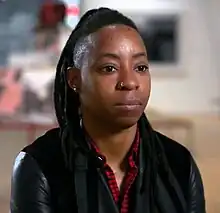Adejoke Aderonke Tugbiyele | |
|---|---|
 Tugbiyele in 2013 | |
| Born | 1977 (age 46–47) Brooklyn, New York City, New York, U.S. |
| Alma mater | New Jersey Institute of Technology, Maryland Institute College of Art |
| Website | www |
Adejoke Aderonke Tugbiyele (born 1977) is a Nigerian-American multidisciplinary visual artist and activist.[1][2] She is known primarily as a sculptor, performer, and filmmaker, but has also worked in painting, drawing, and textiles.[3][4] Her work deals with issues of human rights, queer rights and women's rights.[5][1][6] She lives in Ouagadougou, Burkina Faso.[7]
Biography
Adejoke Aderonke Tugbiyele was born December 4, 1977, in Brooklyn, New York City, New York.[8][9] In early childhood, she moved with her family to Lagos, Nigeria. In high school, she returned to New York City to attend the High School of Art and Design.[7] She identifies as queer.[6]
Tugbiyele has a B.S. degree (2002) in architecture from New Jersey Institute of Technology;[7] and a M.F.A. degree (2013) from the Rinehart School of Sculpture at Maryland Institute College of Art (MICA).[8]
Tugbiyele's work has been influenced by artists including El Anatsui, Fela Kuti, Ai Weiwei, Kara Walker, Zanele Muholi, and Rotimi Fani-Kayode.[6]
Tugbiyele has been affiliated with the Nigerian NGO, Initiative for Equal Rights which provides emergency assistance to LGBT Nigerians.[6] She has served as a United States-based representative for Solidarity Alliance for Human Rights, a coalition of Nigerian organizations working for human rights, queer rights and activism, and to fight against HIV/AIDS.[6]
Her work is in various public museum collections, including the Brooklyn Museum,[10] and Museum of Modern Art, Warsaw.[11]
References
- 1 2 Larson, Vanessa H. (July 18, 2019). "The National Museum of African Art has doubled its holdings of art by women. This show puts their work in the spotlight". The Washington Post.
- ↑ Perrée, Rob (2018-03-03). "Adejoke Tugbiyele: I live by example". AFRICANAH.ORG. Arena for Contemporary African, African-American and Caribbean Art. Retrieved 2021-11-30.
- ↑ Thomas, Alexandra M. (2020-10-29). "Embodying a Queer, Pan-Africanist Approach to Spirituality". Hyperallergic. Retrieved 2021-11-30.
- ↑ Goniwe, Thembinkosi. "Hybrid Spirit: Thembinkosi Goniwe reflects on the work of Adejoke Tugbiyele". Art Africa Magazine. Archived from the original on 2021-11-30. Retrieved 2021-11-30.
- ↑ Kuijers, Isabella (October 7, 2015). "Manuscript Truths: Adejoke Tugbiyele's 'Testimony'". ArtThrob. Retrieved 2021-11-30.
- 1 2 3 4 5 Sefa-Boakye, Jennifer (2015-06-09). "Nigerian-American LGBT Activist & Artist Adejoke Tugbiyele's 'Queer African Spirit'". OkayAfrica. Retrieved 2021-11-30.
- 1 2 3 Preece, Robert (2020-09-23). "Beyond Physicality: A Conversation with Adejoke Tugbiyele". Sculpture. Retrieved 2021-11-30.
- 1 2 "Artists: Adejoke Tugbiyele". National Museum of African Art, Smithsonian Institution. Archived from the original on 2021-11-30. Retrieved 2021-11-30.
- ↑ "This Week in African Arts and Culture (October 25 – 31, 2020)". Sugarcane Magazine, Black Art Magazine. 2020-11-02. Retrieved 2021-11-30.
- ↑ "Homeless Hungry Homo". Brooklyn Museum. Retrieved 2021-11-30.
- ↑ "Adejoke Tugbiyele, Afrykańska odyseja IV: 100 lat później". Muzeum Sztuki Nowoczesnej w Warszawie (in Polish). Retrieved 2021-11-30.
Further reading
- Bass, K. (2015). Silenced Voices, Threatened Lives: The Impact of Nigeria's Anti-LGBTI Law on Freedom of Expression. Pen American Center.
- Tugbiyele, Adejoke (February 13, 2014). "Personal is Political: Sexual Identity and "Nigerian Culture"". The Feminist Wire.
- van Rensburg, Storm Janse (June 2014). "Back to Nigeria - Adejoke Tugbiyele". Metropolis M, No 3 (in Dutch).